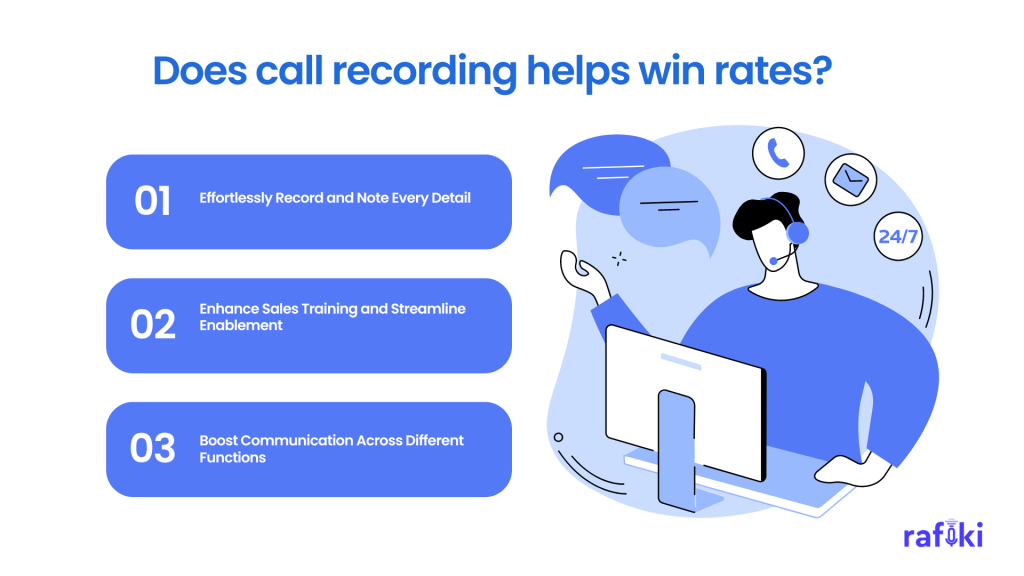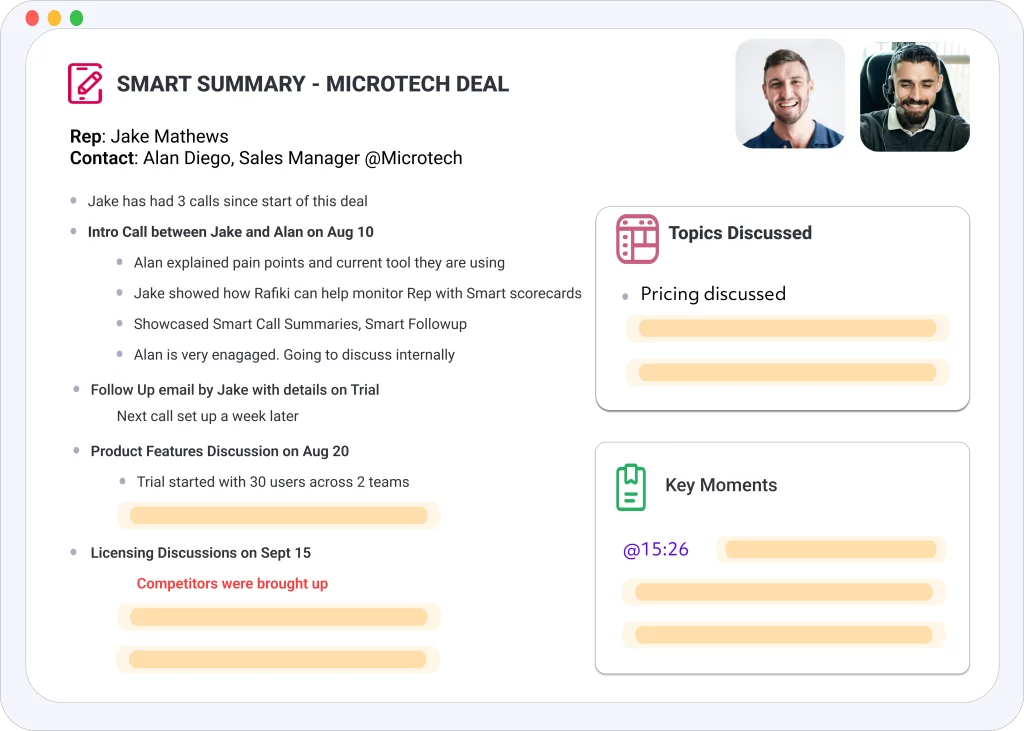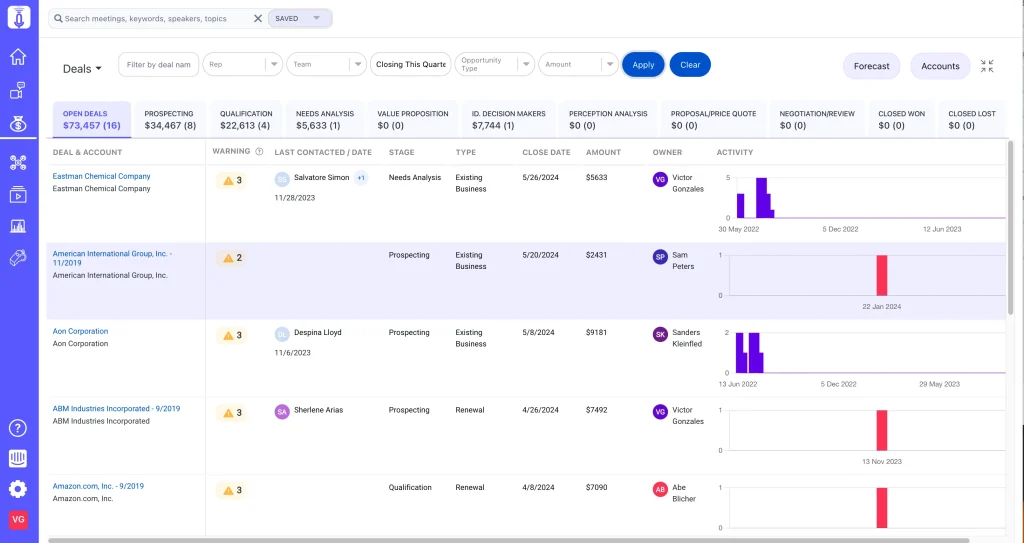Why Rafiki
Pricing


Pricing
Solutions

RevOps Leaders
Synchronize revenue generating functions

SDR Leaders
Get your team aligned and Coach your Reps 3x faster at scale

Sales Leaders
Unlock pipeline truth, drive confident forecasts

In today's fast-paced sales environment, Artificial Intelligence - AI and call recordings are emerging as transformative tools for sales teams, offering unprecedented insights and efficiency enhancements. These technologies allow for detailed analysis and data-driven strategies that were once beyond reach. By capturing every interaction in a sales call, AI can analyze speech patterns, gauge customer sentiment, and provide actionable feedback, all of which help sales professionals refine their approaches and ultimately close more deals.
According to HubSpot, AI is revolutionizing how sales professionals engage with prospects, by automating routine tasks and enhancing personalization. AI tools significantly reduce the time sales teams spend on administrative tasks, enabling them to focus on more strategic aspects of selling such as relationship building and personalized outreach .
However, sales teams that have yet to adopt these technologies face significant challenges. Without the benefits of AI and call recordings, teams often miss crucial details and insights during customer interactions, leading to inefficiencies and missed opportunities. The inability to capture and analyze each customer interaction in-depth can result in a lack of personalized follow-up and suboptimal customer engagement. As we explore the impact of AI and call recordings, we'll see how these tools not only overcome such challenges but also set new standards for achieving sales excellence.
Sales teams that leverage these AI capabilities are better positioned to meet their targets and excel in the competitive market .
The meticulous capture of every detail in sales conversations through call recordings is pivotal to modern sales strategies. In sales, the devil is often in the details—nuances in tone, specific words used, and the context of queries can all signify the difference between closing a deal and losing a potential customer. These recordings act as a veritable treasure trove of information, enabling sales teams to revisit conversations and extract critical insights that may have been overlooked during the initial interaction.
Moreover, the utility of call recordings extends beyond mere data capture. For sales professionals, the pressure to remember every detail and jot down notes during a conversation can detract from the primary goal of engaging effectively with the customer. Recorded calls alleviate this pressure, freeing sales personnel to fully immerse themselves in the conversation. This focused engagement helps them better understand customer needs, address concerns more adeptly, and build stronger relationships, all while the AI works in the background to document the critical elements of the discussion.

Key Benefits of Analyzing Sales Calls
The analysis of call recordings offers multiple benefits:
Using call recordings effectively can transform the sales process by providing detailed insights and freeing sales teams to engage more meaningfully with customers, thereby enhancing the overall sales strategy. Tools like Rafiki make this process very easy very sales team.
Sales training and enablement are crucial for developing effective sales teams. Call recordings, bolstered by tools like Rafiki, play a pivotal role in this development by providing real-world data that creates teachable moments and enhances training efforts.
Rafiki’s integration into the sales training process not only streamlines these activities but also ensures that every sales call is a learning opportunity. This approach not only optimizes the training phase but also significantly impacts the overall effectiveness and efficiency of the sales team.
Sales call insights offer significant benefits beyond the sales department, impacting marketing, product development, and other areas of a company. These insights can be strategically shared across teams to enhance product-market fit and refine marketing strategies.
Enhancing Marketing Strategies
Informing Product Development
Sharing Insights Across Teams
By leveraging sales call insights across various functions within the company, organizations can ensure that every team is equipped with the knowledge to make informed decisions that drive customer satisfaction and business growth. This integrated approach not only improves internal alignment but also significantly enhances the company's ability to respond to market demands and customer needs effectively.
The use of recorded sales calls has been a topic of interest among sales professionals aiming to enhance their deal-closing capabilities. Here’s how recorded calls can potentially improve deal win rates:
Recorded calls allow sales teams to replay conversations and catch nuances or details they might have missed during the live interaction. This deeper understanding of customer needs and pain points enables sales reps to tailor their follow-up communications more effectively, thereby increasing the chances of winning deals.
By analyzing recordings, sales managers can identify best practices and areas for improvement. This feedback is invaluable for training sessions, helping to elevate the skills of sales reps. Improved sales techniques directly contribute to better customer interactions and potentially higher win rates.
Recorded calls help ensure that all team members are on the same page regarding product information and sales tactics. Consistency in messaging is crucial, especially in complex sales cycles, as it helps build trust and clarity with potential customers.
Sales reps can review how they handled objections and questions in past calls. This review process helps them develop quicker, more effective responses for future interactions, increasing the likelihood of positive outcomes.
With a substantial archive of recorded calls, organizations can analyze what strategies are working and which aren’t. This data-driven approach allows for refined sales tactics that are more likely to resonate with target audiences and close deals.

In summary, while recorded sales calls are not a magic solution that guarantees increased deal win rates, they are a powerful tool for continuous improvement. By leveraging recordings to gain insights, train better, ensure consistency, and refine strategies, sales teams can significantly enhance their effectiveness, leading to better performance and increased win rates.
Implementing sales call recording effectively involves understanding both the technology and strategies necessary to maximize its benefits. Here's how to get started, with a focus on AI-based transcription and Rafiki's automated call summaries.
Select a call recording tool that integrates well with your existing sales stack. Ensure it supports AI-based transcription and automated summaries, like Rafiki, which can dramatically streamline the analysis and review process.
Once you've selected a tool, integrate it with your CRM and other sales platforms. This integration ensures that all call data feeds directly into your sales processes, enhancing accessibility and usability.
Utilize AI to transcribe your recorded calls. AI transcription converts speech into structured, searchable text, making it easier to analyze conversations and extract valuable insights. This technology allows you to review calls more efficiently than listening to recordings.
Rafiki's technology not only records and transcribes calls but also provides automated summaries. These summaries highlight key points and topics discussed during the call, allowing sales reps to focus more on the customer and less on note-taking. By understanding the essence of each call quickly, reps can prepare better follow-ups and address customer needs more effectively.
Train your sales team on how to use the recording and transcription tools. Emphasize the benefits, such as more time to focus on sales tactics rather than note-taking, and demonstrate how they can use the tool to improve their sales outcomes.
Ensure compliance with legal requirements related to call recording. This includes obtaining consent where required and respecting privacy laws, which are critical to ethically using call recording technologies.
Regularly review the effectiveness of your call recording setup. Seek feedback from your sales team on the utility of AI transcriptions and summaries, and adjust your tools and processes accordingly.

By following these steps, sales teams can implement call recording technologies that not only capture every detail of customer interactions but also enhance the overall sales process through smarter, AI-powered insights.
Rafiki's automated summaries serve as a particularly powerful feature, ensuring that sales reps can concentrate on what truly matters—building relationships and closing deals.
Call recordings provide invaluable insights, and Rafiki simplifies this process significantly. Rafiki effortlessly records each call, transcribes the dialogue, and produces intelligent summaries.
Transforming any recorded call into a shareable snippet or playlist section is straightforward. Users can determine the length of the snippet, then distribute it via a link or a connected application such as Slack.
Teams can access a comprehensive archive of call histories, notes, and synchronized transcripts for every sales interaction directly through their CRM. Rafiki enhances this functionality by integrating conversation insights into its dashboards, which also sync with your CRM for seamless data coherence.
Rafiki's activity dashboards meticulously sift through essential details and metrics to display primary insights from calls. These dashboards help assess the overall effectiveness of sales interactions, allowing users to filter calls by performance levels, deal stages, conversation counts, and time spent on calls per account.
Every conversation holds valuable data that should be fully utilized. While typical call recording platforms may only offer recording and transcription services, Rafiki elevates this by extracting actionable insights directly from each call. Through AI scorecards, Rafiki significantly reduces the sales cycle, providing comprehensive call coverage and enabling real-time, targeted coaching.

Rafiki's activity dashboards provide individual team members' performance metrics, helping managers identify successful strategies and areas needing improvement. These dashboards allow for an in-depth analysis of top performers, identifying the conversation strategies that contribute to their success. Simultaneously, they highlight opportunities for quick improvements and more extensive training for those performing less effectively.
It's difficult to overstate the benefits that come from automatically extracting value from recorded calls, especially since many sales teams still depend on manual note-taking and team-led pipeline reviews. Manual methods often fail to capture deep insights due to human error and inherent biases.
Enhance Deal Success with AI-Powered Call Recordings
Rafiki is designed for dynamic sales teams eager to uncover the true narrative from every interaction, whether from their own calls or those of their colleagues. When calls are recorded and analyzed, every piece of data becomes actionable.
Enhance the efficiency of your sales team, the effectiveness of managerial coaching, and the voice of the customer communications across functions with a comprehensive sales platform that integrates seamlessly with your CRM.